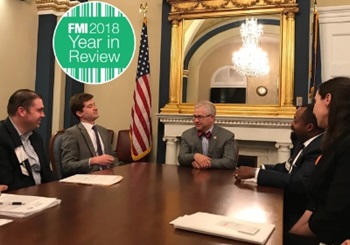By: Jennifer Hatcher, Chief Public Policy Officer, Senior Vice President, Government and Public Affairs
Election years are typically synonymous with gridlock and inefficiency in Washington, but FMI’s government relations team was successful on several policy fronts this year. On a macro level, three areas made the greatest impact on boosting your bottom line – tax reform implementation; reducing regulations and confirming business-friendly judges. FMI worked behind the scenes in each of these areas, but also in some lower profile areas at the federal, state and local levels and in the preliminary as well as legislative and regulatory stages.
It should go without saying, but our achievements and successes were only possible with the hard work, expertise and insight of our members throughout the year.
In 2018, we effectively prepared companies for the beginning of menu labeling compliance in May. In addition to the House passage of the Common Sense Nutrition Disclosure Act (H.R 772), FMI developed compliance materials, including in-store signage and calorie count resources.
We have been working with the administration and member companies regarding the fair and effective implementation of the landmark tax reform law.
Additionally, FMI protected confidential store-level data and the integrity of the SNAP program through ongoing legislative and legal efforts.
FMI’s annual Day in Washington fly-in in April had the highest CEO-level participation in years, which helped us prove more persuasive during discussions on the Farm Bill. We focused on advocating for a ban on EBT processing fees and protecting the integrity of SNAP. Mark your calendar to join us April 30-May 1, 2019 in Washington.
FMI and our members take payments security very seriously, which led us to start a new coalition to develop sound policies and advance payments security. FMI joined other retail trade associations, debit processing networks and retailers to launch the Secure Payments Partnership, charged with improving security and transparency across the U.S. payments system.
This year, we also enhanced our resources to address pharmacy issues to help the 12,000 pharmacies represented in the FMI membership. We hired a new director, health and food policy, whose portfolio includes a renewed focus on pharmacy issues, particularly with the integration of food. We also restarted our Pharmacy Report newsletter, created a share group, expanded our work on DIR fee reform and continued to identify new legislative and regulatory challenges and opportunities within the pharmacy aisle including webinars on reducing opioid use and background on hemp, CBD and cannabis.
Because ideas tend to catch fire in the states and quickly spread, FMI tracks some 80 state issues across the nation and responds to countless information requests from our members and state associations. FMI’s state affairs team supplied members with the resources they need for the upcoming legislative sessions through: the creation of key issue papers, conducting four regional legislative meetings, and hosting our signature information and networking event – the State Issues Retreat. Additionally, FMI state affairs continued the work of monitoring and lobbying against unfavorable state regulatory items in the weights and measures realm – proposals that have the ability to cost our members big money.
The trend of increased policymaking at the local level continued in 2018. From plastic bag bans to minimum wage and employer mandates to taxes on sugar and other grocery products, cities, towns and counties in 2018 were a growing source of regulation on business. With the newly divided Congress, this trend may only accelerate in 2019. To keep members engaged and informed on local issues, FMI tracks 10 priority issues at the local level in all 50 states. Our issue papers and other in-depth background documents help our members and state grocery retail associations successfully advocate for the industry’s priorities to local officials. In addition, we responded to dozens of information requests on local issues and issued more than 50 “Local Monitoring Report” newsletter updates to members and state associations in 2018, on top of hundreds of real-time agenda alerts.
This year, we grew our political programs, FoodPAC and FMI’s LEAD Fund, which are a critical part of our work – electing and reelecting members of Congress and Senators who are receptive to hearing about industry issues. FoodPAC hosted 19 events and was instrumental in protecting several key incumbents who have strongly supported the food retail industry. The 2018 FMI Food Industry Golf Tournament at Midwinter outraised the last six tournaments and had historic retailer participation. Contributions combined with research, advocacy and coalitions ensure our issue perspectives are backed by facts and statistics in addition to member first-hand experience.
We continue to work with lawmakers from both parties and executive branch officials to ensure that the interests of the food industry and our customers are elevated when policy discussions take place. For a more detailed overview of our successes and achievements this year, please visit our linked “successes” document, and please sign-up for our weekly GR Report member newsletter to get developments as they happen.


 Industry Topics address your specific area of expertise with resources, reports, events and more.
Industry Topics address your specific area of expertise with resources, reports, events and more.
 Our Research covers consumer behavior and retail operation benchmarks so you can make informed business decisions.
Our Research covers consumer behavior and retail operation benchmarks so you can make informed business decisions.
 Events and Education including online and in-person help you advance your food retail career.
Events and Education including online and in-person help you advance your food retail career.
 Food Safety training, resources and guidance that help you create a company food safety culture.
Food Safety training, resources and guidance that help you create a company food safety culture.
 Government Affairs work — federal and state — on the latest food industry policy, regulatory and legislative issues.
Government Affairs work — federal and state — on the latest food industry policy, regulatory and legislative issues.
 Get Involved. From industry awards to newsletters and committees, these resources help you take advantage of your membership.
Get Involved. From industry awards to newsletters and committees, these resources help you take advantage of your membership.
 Best practices, guidance documents, infographics, signage and more for the food industry on the COVID-19 pandemic.
Best practices, guidance documents, infographics, signage and more for the food industry on the COVID-19 pandemic.
